

We as caregivers are often their last line of defense against social isolation, and I will also be sharing tips on how to help them and also ensure we do not neglect our own health in the process. After all, we are only as effective as the condition we are in. Definition. What is social isolation? Written by: No Isolation Last updated: June 5, 2020 Social isolation is a term often used interchangeably with loneliness, but while the two are closely related, they do not necessarily mean the same thing.
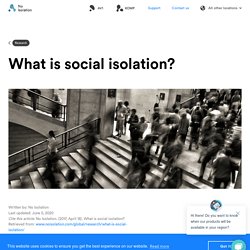
You can be lonely in a crowd, but you will not be socially isolated. Isolation has been defined as an objective state whereby the number of contacts a person has can be counted, whereas loneliness is a subjective experience. While the terms may have slightly different meanings, both can be painful experiences and have a harmful impact on the individual. Social Isolation vs Loneliness. World Parkinson's Program On Social Isolation vs Loneliness. Goodtherapy's Guide on Isolation and Loneliness. Some people use the words “isolation” and “loneliness” interchangeably, but this does not reflect the true meaning of each term.
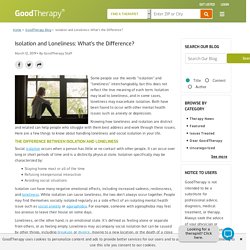
Isolation may lead to loneliness, and in some cases, loneliness may exacerbate isolation. Both have been found to occur with other mental health issues such as anxiety or depression. Elderly's susceptibility to social isolation & loneliness; factors. 7 factors that could lead to social isolation. Winter can be an especially solitary time for some seniors, who may find they are spending more time alone in their homes because of bad weather or lack of transportation.

Canadian research shows that isolation isn’t just confined to the winter months for older adults: a recent federal government profile of social isolation estimated that 30 per cent of seniors are at risk of becoming socially isolated.* A report from the International Federation of Ageing also identified social isolation as one of the top issues facing Canada’s aging population.* What does it mean to be socially isolated? While researchers give us differing versions of a complex term, it’s generally agreed to include a low number and quality of contact with others, as well as a lack of rewarding relationships. Unexpected Causes of Senior Isolation. While seniors have lived full and fulfilling lives, they may experience loneliness and isolation as they get older.
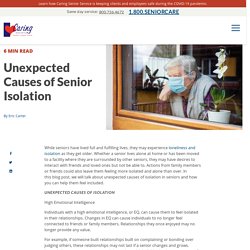
Whether a senior lives alone at home or has been moved to a facility where they are surrounded by other seniors, they may have desires to interact with friends and loved ones but not be able to. Actions from family members or friends could also leave them feeling more isolated and alone than over. Causes of Social Isolation in Elderly Adults.
No one likes to feel lonely or isolated, but for many seniors, it’s a feeling they know all too well.
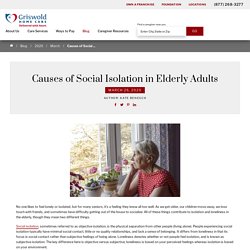
As we get older, our children move away, we lose touch with friends, and sometimes have difficulty getting out of the house to socialize. All of these things contribute to isolation and loneliness in the elderly, though they mean two different things. Signs of Isolation in the elderly. Bracknell Forest Council's tips for dealing with social isolation and loneliness. Social Isolation and Loneliness in Older Adults: Opportunities for the Health Care System. At the status of at-risk populations in other countries (e.g., Steptoe et al., 2013; Zebhauser et al., 2014), studies focusing on at-risk subpopulations in the United States are sparse.
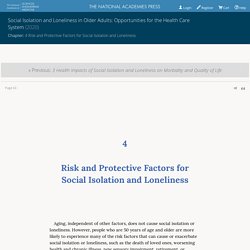
Two populations in the United States that have been researched more extensively than others are immigrants and individuals who identify as part of the gay, lesbian, bisexual, and transgender community. Research pertaining to these two groups is described below. Immigrants Evidence suggests that immigrants are more likely to experience social isolation and possibly loneliness than non-immigrants. For example, Latino immigrants have fewer social ties and lower levels of social integration than U.S. In general, immigrants experience many stressors that can increase their social isolation, including language and communication barriers; differences in community, family, or intergenerational dynamics; and new relationships that lack depth or history. Gay, Lesbian, and Bisexual Populations. Promoting Cognitive Functions for the elderly. We recently published an evidence-based resource to support local authorities, commissioners and providers to promote cognitive health in older adults aged 55 and above.
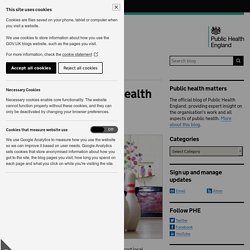
This is an important issue because, whilst the fact that people are living longer lives is a public health success story, we know that many of these extra years are spent in ill health or disability. The next challenge for the health and social care sector is to support individuals to prevent ill health in later years and increase healthy life expectancy, so it's crucial that older adults are supported to maintain and improve their physical, mental and social health and wellbeing. An alarming proportion of mid-life and older adults are physically inactive, smoke, misuse alcohol, have poor eating patterns and are socially isolated, putting them at risk of substantially increased mortality and ill health.
The resource is based on three systematic reviews conducted by the Cambridge Institute of Public Health (CIPH). Health impact of social isolation, loneliness on seniors. Research: Social isolation and loneliness - relationships with cognitive function during 4 years of follow-up in the English Longitudinal Study of Ageing. Objective: This study aims to evaluate the impact of social isolation and loneliness, individually and simultaneously, on cognitive function in older adults during a 4-year period, using data from the English Longitudinal Study of Ageing, and to evaluate if these associations are moderated by educational level.
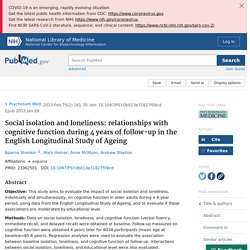
Methods: Data on social isolation, loneliness, and cognitive function (verbal fluency, immediate recall, and delayed recall) were obtained at baseline. Follow-up measures on cognitive function were obtained 4 years later for 6034 participants (mean age at baseline=65.6 years). Regression analyses were used to evaluate the association between baseline isolation, loneliness, and cognitive function at follow-up.
Social Isolation is Bad for the Mental Health of Older Adults. Social integration and having positive social relationships are important for our health and well-being, especially in old age.
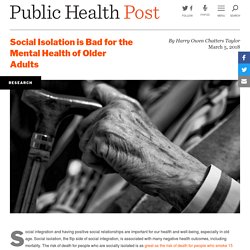
Social isolation, the flip side of social integration, is associated with many negative health outcomes, including mortality. The risk of death for people who are socially isolated is as great as the risk of death for people who smoke 15 cigarettes a day. As such, many prominent national and international organizations have now called for a greater understanding of social isolation and how to mitigate its deadly effects. These include the World Health Organization, the National Academy of Medicine, the AARP Foundation, and the American Academy of Social Work and Social Welfare’s Grand Challenges of Social Work. Addressing social isolation among older adults is critically important, as populations around the world are becoming older. Loneliness and Social Isolation Linked to Serious Health Conditions. Social isolation was associated with about a 50% increased risk of dementia and other serious medical conditions.
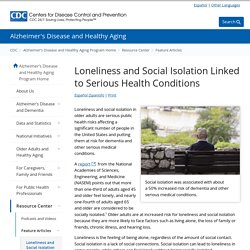
Loneliness and social isolation in older adults are serious public health risks affecting a significant number of people in the United States and putting them at risk for dementia and other serious medical conditions. A new reportexternal icon from the National Academies of Sciences, Engineering, and Medicine (NASEM) points out that more than one-third of adults aged 45 and older feel lonely, and nearly one-fourth of adults aged 65 and older are considered to be socially isolated.1 Older adults are at increased risk for loneliness and social isolation because they are more likely to face factors such as living alone, the loss of family or friends, chronic illness, and hearing loss.
Loneliness is the feeling being alone, regardless of the amount of social contact. Loneliness & Isolation. Health effects of social isolation and loneliness. Clifford Singer, MD Adjunct Professor, University of Maine Chief, Geriatric Mental Health and Neuropsychiatry Acadia Hospital and Eastern Maine Medical Center 268 Stillwater Avenue Bangor Maine 04402 207.973.6179 csinger@emhs.org Cliff Singer is a geriatrician and psychiatrist.
He lives in Orono, Maine and directs the Mood and Memory Clinic at Acadia Hospital and Alzheimer’s Disease Research Program for Acadia Hospital and Eastern Maine Medical Center in Bangor. Social isolation: The COVID-19 pandemic's hidden health risk for older adults, and how to manage it. As coronavirus cases rise again, it can be hard for older adults to see any end to the need for social isolation and the loneliness that can come with it. For months now, they have been following public health advice to reduce their risk of exposure by staying home, knowing an infection can have life-threatening complications. But sheltering at home has also meant staying distant from family, friends and the places that kept them active and engaged. Inadvertently, the COVID-19 safety guidelines to self-isolate have created new health risks by leaving many older adults even more socially isolated and inactive than before.
COVID-19 and Social Isolation Puts Elderly at Risk for Loneliness. By Gary Call, MD To protect our elderly and chronically ill from COVID-19, we’ve asked this population to isolate at home. This is the best way to keep them safe. But how do we protect this population, already at high risk for loneliness, from the health risks that come with isolation? Social Isolation Leads to Depression for Seniors. As people age, they may become isolated; and that isolation can lead to depression, according to a recent post from the Straits Times. A study led by Dr. Isolating the Elderly Is Bad for Their Health. The effects of isolation on the physical and mental health of older adults.
With the world in the grip of the covid-19 pandemic, unprecedented restrictions have been placed on social freedoms. The UK government has asked those aged 70 years and older to follow strict social distancing measures to reduce the transmission of, and susceptibility to, covid-19. These restrictions involve: reducing social mixing in the community, not having friends and family visiting the house, and minimising the use of public transport. Moreover, individuals with certain high-risk conditions are advised to not leave the home at all. [1] While undoubtedly vital to reduce the impact of covid-19 on this vulnerable group, which is more susceptible to severe disease, these interventions carry risk, particularly on physical activity profiles and on mental health.
How can we mitigate this? Physical activity. Older adults who are socially isolated tend to perform worse on tests of thinking abilities. How Social Isolation Affects the Brain. Daisy Fancourt was at her home in Surrey in southeast England when the UK government formally announced a nationwide lockdown. Cognitive Development in Late Adulthood - PSY 180 - Psychology of Aging - Textbook - LibGuides at Hostos Community College Library. Cognitive Development in Late Adulthood. Health effects of social isolation and loneliness.
Family Caregiver Guide: Caring for a Senior At Home. Custom Search Family Caregiver Guide: Caring for a Senior At Home If you're a family caregiver, this comprehensive guide provides the tools you need to provide the best care for your loved one — while managing stress and time constraints. Preventing Elderly Isolation. Ways to Tackle Depression and Social Isolation in the Elderly Using Technology – SilverActivities Blog. February 27, 2019. Family Caregiving Roles and Impacts - Families Caring for an Aging America - NCBI Bookshelf. How to Avoid Social Isolation During Coronavirus Pandemic. 2. Plan and connect It's important to talk to family and friends to develop a plan to safely stay in regular touch as we socially distance ourselves, or if we are required to self-quarantine for a possible exposure or are in isolation for a COVID-19 infection. COVID-19: Ensuring the elderly don't become isolated during the outbreak. SINGAPORE: Organisations that provide care and support for the elderly are stepping up outreach efforts to prevent loneliness and heightened isolation among old folks during tighter safe distancing measures put in place during the COVID-19 pandemic.
To protect seniors – a vulnerable group at a higher risk of getting a severe infection – activities for them were already suspended earlier in March. With further distancing measures in place, the lack of social interaction and physical activity could have a negative impact on the mental and physical health of vulnerable elderly populations, said Dr Chris Tsoi a senior consultant from the department of psychological medicine at the National University Hospital (NUH).
Madam Koh lives alone and has already seen reduced social interactions over the past few weeks. “No, no I don’t go out. Ways of Preventing Social Isolation Among Seniors. As seniors age, their lives can become more isolated. Recovery Intervention to Promote Social Connectedness through Social Recreational Programs for Persons with Dementia: A Critical Analysis. 1. Caregiver Stress and Burnout. Caregiver's burnout guide. 9 Coping Strategies for Caregivers of Seniors - My Mental Health. Family Caregiver Alliance. 6 Self-Care Tips <3. TOUCH Caregivers Support (TCG) Singapore. Caregiver Support Groups in Singapore. Caregiver Support. Summary & Questions.